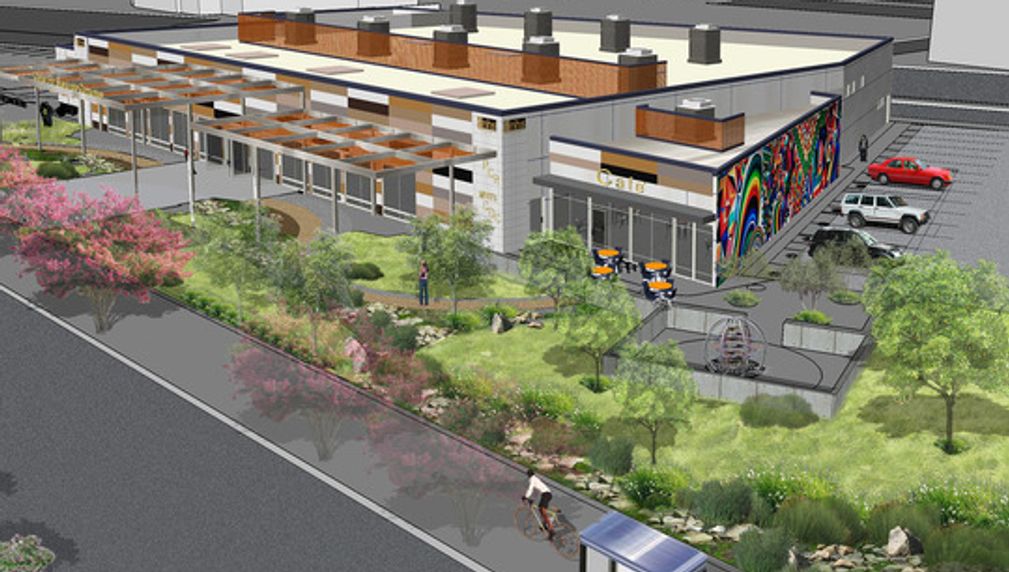Center for Sustainable Communities
Built on the site of a blighted grocery store in Compton, the 28,000 sq ft Center will serve as a hub for nonprofits and feature small business incubators, a health clinic, and community gardens.

Are any other organizations collaborating on this proposal?
- Los Angeles Conservation Corps (LACC), - Pacific Coast Regional Small Business Development Corp (PCR), - METRO CDC, - City of Compton, - Christian Health Clinics
Please describe your project proposal.
Utilizing the model of 'What Makes Community?' as our focus, NHS is working with the City of Compton, Pacific Coast Regional, and METRO CDC to create the first of several Centers for Sustainable Communities in Compton, CA. The Center will help low-to-middle income families in Compton deal with the impacts of divestiture by serving as a hub to provide access to housing, transit, employment, healthy living, and community food resources that make communities stronger and more resilient.
Which of the LIVE metrics will your proposal impact?
Access to healthy food
Housing affordability
Waterways
Healthcare access
Self-sufficiency
Obesity
Local water
Resilient communities
Residents receiving coordinated healthcare services
Walk/bike/transit score
In what areas of Los Angeles will you be directly working?
Central LA
South LA
Gateway Cities
County of Los Angeles
City of Los Angeles
Describe in greater detail how your proposal will make LA the best place to LIVE?
The Center for Sustainable Communities is a diverse, multi-use 28,000 sq ft community facility in Compton, CA that will provide a broad range of critically needed services, information, and access to resources for underserved families living in blighted neighborhoods. The Center will serve thousands of low-to-moderate (LMI) income families annually in a region that has endured many of the worst impacts of the economic downturn and decades of blight. Of primary concern is how to deal with the growing challenges among these neighborhoods regarding chronic unemployment/underemployment, reduced capital access for small business development, the ongoing threat of food insecurity, substandard transit options, skyrocketing housing costs, educational disparities, and youth disengagement.
In response, the Center for Sustainable Communities will provide the people of Compton and South Los Angeles County a facility that will serve as a hub to build a solid foundation for creating neighborhood sustainability over the next decades. Specific impacts include 1) Improving the job readiness and overall skills base of local workforce; 2) Providing healthy living resources and medical clinic services to residents; 3) Reaching and training residents through the CSC Neighborhood Revitalization Institute; 4) Increasing access to business incubator services and originating loans for small business owners; 5) Engaging youth in on-site workforce and mentoring programs; 6) Assisting families through our Financial Opportunity Center; 7) Establishing community garden projects on the property and in surrounding neighborhoods; 8) Sharing educational resources through an on-site library; 9) Providing green education and conservation programs; 10) Promoting community safety with a Public Safety Drop In Site - Fire, Paramedic, Building & Safety; and 11) Creating healthy food options through an organic cafe. In addition to meeting crucial resource access needs for families, the Center will allow its partners to share sustainability concepts that drive planning approaches in other impacted communities throughout South Los Angeles and LA County.
As the facility grows, the Center will expand to help hundreds of small business owners, neighborhood non-profit groups, and homeowners through on-site services and regional partnerships with community service groups, community development agencies, green organizations, health providers, technology professionals, schools, and municipalities. At least 50% of our tenants will be service-driven. By December 2016 we expect to partner with the adjacent Los Angeles Conservation Corps Campus to magnify our regional impact, collaborate to attract a wide range of volunteers for our municipal water and green projects, and reach out to the educational community as the Compton Creek Project evolves.
Please explain how you will define and measure success for your project.
Our expected outcomes will make a vital difference for families and small businesses looking to increase access to neighborhood resources, improve community health, and expand sustainable economic redevelopment in Compton and South Los Angeles County. Annual goals include:
- Providing financial education and affordable housing services to 750 residents;
- Expanding Neighborhood Revitalization Institute programming to engage 150 residents with community leadership training;
- Improving job readiness by 20% among 100 youth through PCR and METRO CDC job training programs;
- Expanding small business growth by 25% and creating incubator programs to serve 10 entrepreneurs/businesses;
- Enhancing healthy food options and outcomes by building 35 gardens and providing 300 residents with healthy living education;
- Providing job training to 120 residents.
Gauging the success and impact of the project will require tracking data among partners and service providers that utilize the facility. NHS will work with partners to consolidate and filter impact data of those taking courses, attending classes, and receiving training. Affiliated groups working through the Center will be asked to share all relevant statistics and deliverables data with NHS. NHS will serve as the central filter for evaluating the impacts and status of job training, homeowner education, senior and afterschool programming, and small business education programs.
How can the LA2050 community and other stakeholders help your proposal succeed?
Money
Volunteers
Advisors/board members
Publicity/awareness
Infrastructure (building/space/vehicles
Technical infrastructure (computers
Community outreach
Network/relationship support